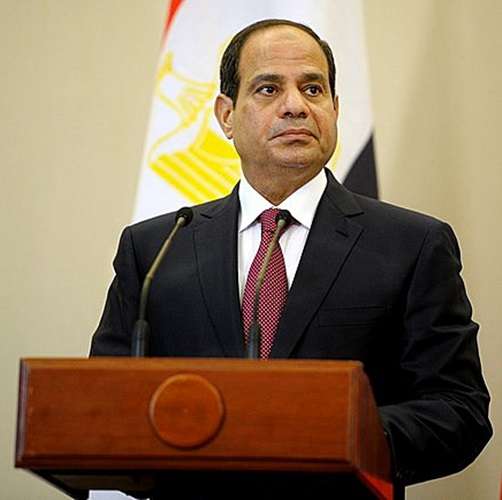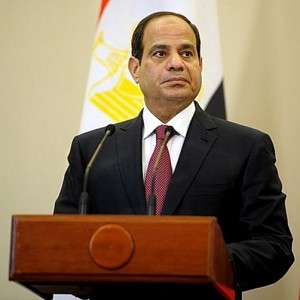What 2016 Hopefuls Fail to See in Sisi
The first Republican debate made it apparent that many presidential candidates have little to no foreign policy experience. Donald Trump’s assertion that Mexican leaders are outsmarting their American counterparts in illegal immigration is a perfect example. Also, let’s not forget former Florida Governor Jeb Bush’s declaration that the United States must defeat the Iranian Nuclear Deal as a prerequisite to eliminating the Islamic State. Nor Wisconsin Governor Scott Walker sounding unclear as to whether or not Egypt was part of Israel. But, a well-hidden foreign policy fallacy that came out of that debate were remarks made by Texas Senator Ted Cruz regarding Egypt’s President, Abdel Fattah al-Sisi.
Cruz set the tone early in the debate, implying that the U.S. presently lacks a President with the courage that Sisi possesses. Cruz, along with a number of other American politicians, are praising Sisi’s speech at Cairo’s Al Azhar University, this past January, where he called for a “religious revolution” in order to “call out Islamic Terrorists.” Cruz further emphasized that Sisi’s courage derives from “strong-handed” anti-terrorist policies to combat Islamist elements from the Muslim Brotherhood or Ikhwan, ISIL, and Egypt’s own Sinai Province Group, an ISIL affiliate. Although, to say that the American political infatuation with Sisi began last month would be a gross understatement.
In fact, similar remarks regarding Sisi by prominent U.S. politicians date back to the immediate aftermath of Sisi’s speech at al-Azhar. In February, Jeb Bush stated that America must balance its belief in short-term individual liberty for security guarantees in the hope of improving long-term Egyptian liberties. Ishaan Tharoor, of the Washington Post, elaborates upon this point noting, “many American conservatives were skeptical of the Arab Spring pro-democracy uprisings, which had yielded electoral victories for Islamists in Tunisia and Egypt, and were relieved to see a secularist backlash.” Now, this political maneuvering towards Egypt is not inherently surprising nor a recent phenomenon. Without question, Egypt is a vital U.S. ally that receives roughly $1.5 billion in U.S. military aid annually. Historically, Egypt has been looked upon as a stable force in a sea of uncertainty, largely due to its geopolitical location. There is also no denying the fact that many conservatives were skeptical of the Arab Spring and look to Sisi as a more predictable actor for U.S. regional interests than Mohammad Morsi.
But, this is where reality delineates from present U.S. presidential hopefuls’ understanding of Egypt. The nature of support for Sisi’s leadership, as proposed by both sides of the American political aisle, conflicts with a normative element of U.S. foreign policy; the promotion of democracy. The reality is that Sisi is former President Mohammed Morsi’s defense minister who overthrew the government in a coup d’etat two years ago. Regrettably, Sisi re-established the exact style of military dictatorship that has characterized Egyptian politics since the end of the Monarchy in 1952. Even more troubling, Egyptian policies under Sisi’s government have been widely criticized for their disregard of human rights. In an effort to crack down on Islamist forces, Sisi largely expanded national police activity. The result of this action has led to the deaths of many Egyptians. According to Human Rights Watch, 900 Egyptians were killed in the Rabaa Massacre in August 2013. Sisi has restricted freedom of the press, banned protests, revised Morsi era legislation, and has crushed his opposition, often with lethal force. HRW has noted that the cost of “restoring stability” has been the lives of 2,600 Egyptians.
Worst of all, these “courageous” policies have been disastrous for Egypt. Outside the clear damage to Egyptian society, Sisi has failed to restore stability to the country. Sisi has instead replaced stability with disenfranchisement, economic hardship, and the growth of domestic terrorism.
Using the August 6th debate as a case study reinforces the notion that American politicians across the political spectrum lack a general understanding of Egypt. American presidential candidates fail to grasp that Sisi is not advancing U.S. security interests at the level they believe he is. The reality is, the present dialogue regarding Sisi shows that American foreign policy circles still have quite a way to go to properly analyze the 21st century geopolitical reality.
Taylor D. Smith is a recent graduate of the School of Diplomacy and International Relations at Seton Hall University. He specialized in Foreign Policy Analysis and International Security with a keen interest in Middle East regional issues. He previously interned as a foreign policy analyst with the United States Coast Guard’s Office of International Affairs and as an advisor with the Permanent Mission of the Republic of Malta to the United Nations. He hopes to be employed in the foreign policy field within the Federal Government.



“Regrettably, Sisi re-established the exact style of military dictatorship ..”.
What led Sisi to this point ? How much suffering Egypt has seen after US
promotion of its democracy style? Viewing Egypt rhetorically and solely through
the lens of Western democracy betrays ignorance of history of both Egypt &
Western democracy. Too sad.
Hello Mr. Othman,
I apologize for the lateness of my response. It’s been a hectic two weeks as I have been taking critical steps in my moving forward in the beginning of my professional career. In regards to your comment, I would love to follow this particular blog up with a more contemporary look at Egypt’s historical perspective and how that has configured into the rise of Sisi to power in order to give the present status of relations between Egypt and the U.S. a more well-rounded look. There is no doubt that factors such as Pan-Arabism, Nasserism, the legacy of colonialism in Egypt, and how Egypt views its leadership role in the Arab World impact the Egyptian outlook. When looking from outside the US-centric worldview, these factors need to be understood in order to configure the trajectory of Egypt’s national dialogue especially since in the aftermath of the “Arab Spring.” You are also correct in your assessment that American political leaders tend to not understand the historical, cultural, political, and economic factors that have guided Egypt to this present point.
Unfortunately, often times, these leaders tend to not have interest in gaining this knowledge at all. There are many reasons for that and I could rant for hours about IR theoreticals such as bureaucratic politics or organization process model. With that in mind, I wrote this blog in a way that was designed to gauge the interest of these individuals in order to bring about a change of thought among American politicians albeit in a one dimensional way. It was written in reflection of American political opinion and, thus, does incorporate some degree of US-centric outlook as a direct result. Though I personally disagree with the notion of overt democracy promotion as well, it is a traditional ideological component of American foreign policy thought; especially within the Republican Party.
This is the difficulty of blog writing Mr. Othman. It is almost impossible to paint an entire picture in 800 short words. There is no way to illustrate all the various strokes of a brush. As a result, I had to display restraint and focus on particular element of what is a very complex reality. But, this is also the greatest strength of blog writing; raising the diversity of thought. I would love to pick your brain more on this issue because Egypt is a very important regional actor not just due to the US military relationship. But, more importantly, due to Egypt’s historical legacy, economic potential, cultural soft power in the Arab world, and more. I greatly appreciate your comment and thoughts on this blog Mr. Othman. Have a great day!